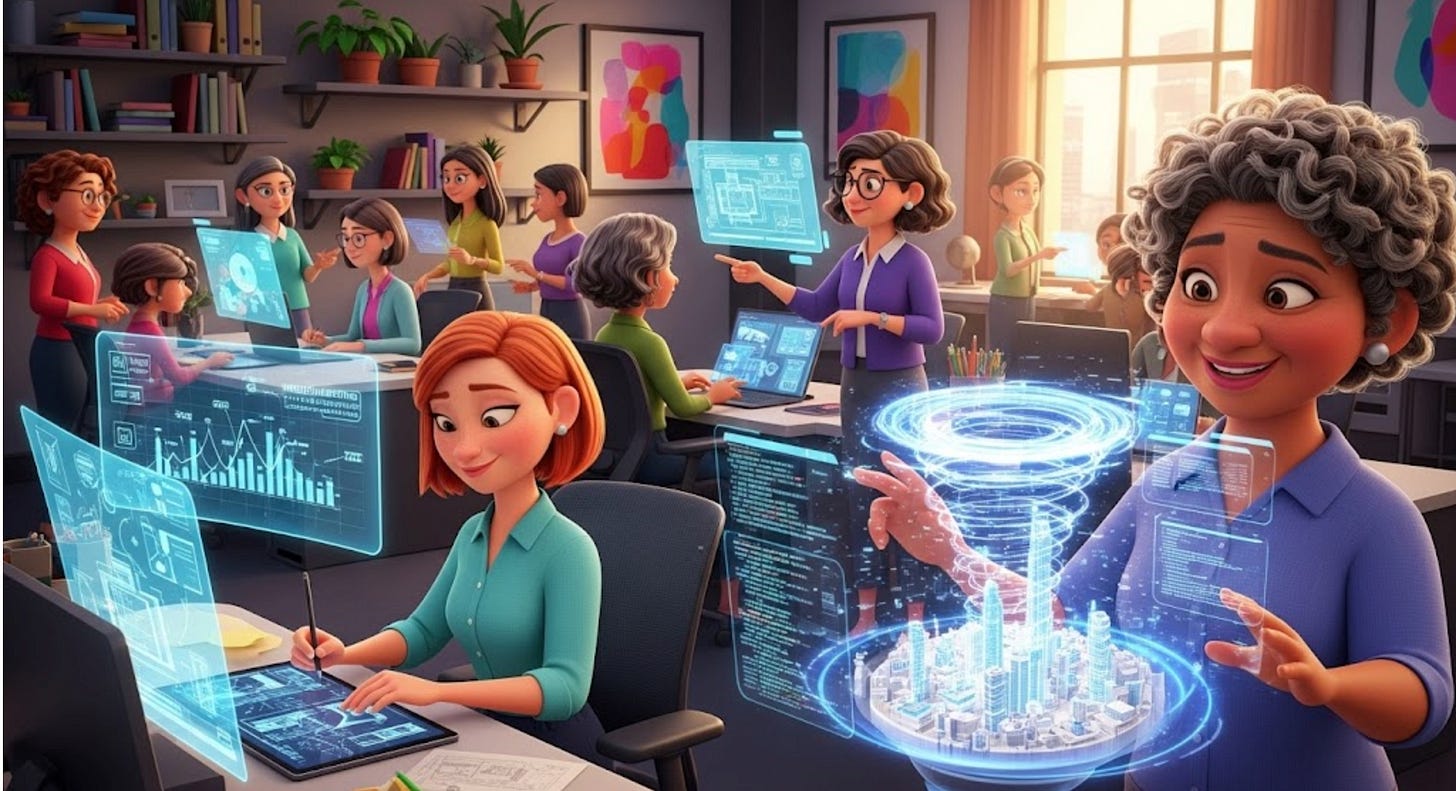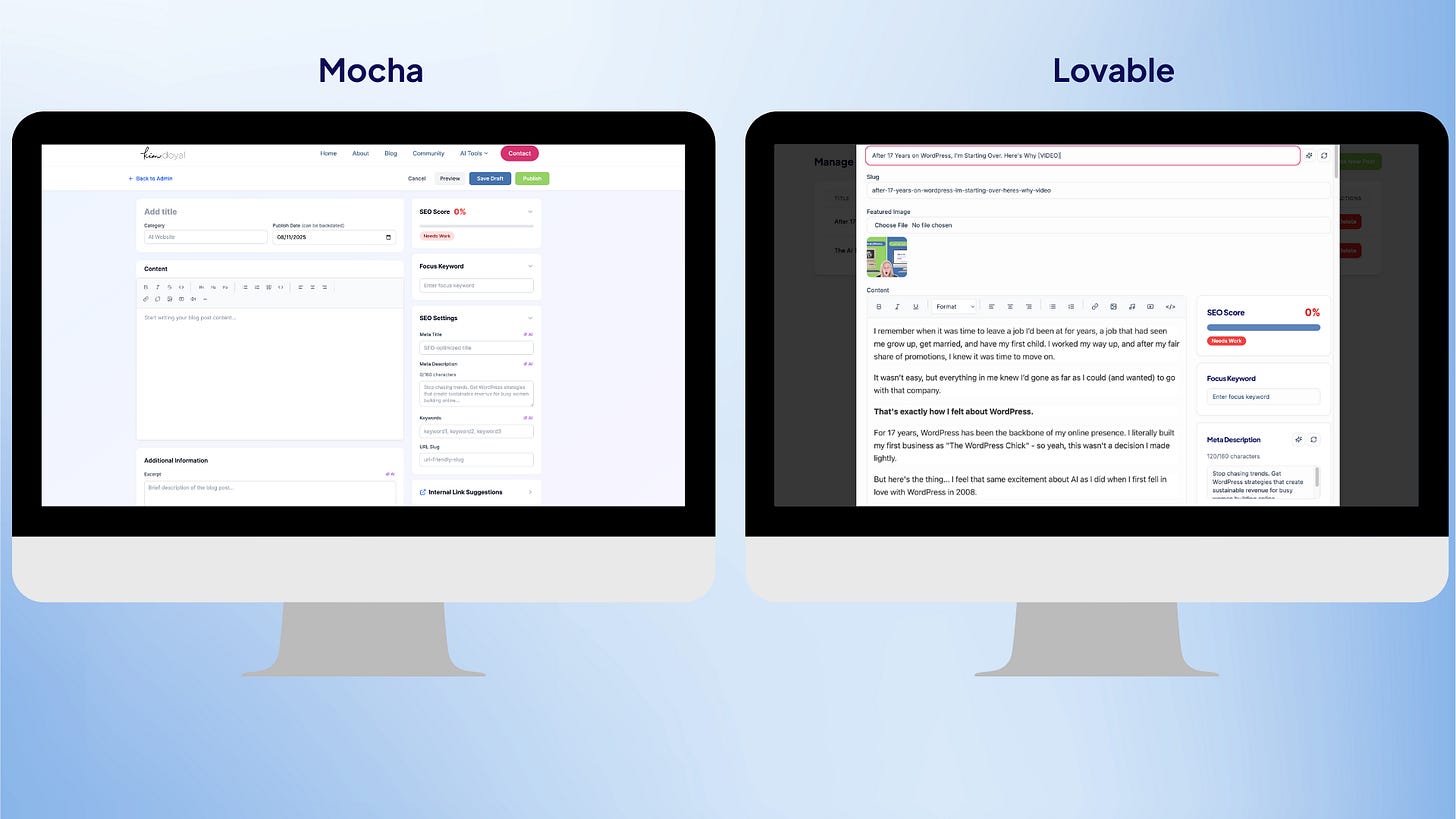Why the Future of AI Needs Your Voice
Every time you don't use AI, you're letting someone else train it for you
"I'm writing this as a woman, from a woman's perspective, about what I see missing in AI. The smart men on my list already get why this matters for everyone."
After moving my TypeQuiz app over to Mocha, I bit the bullet and started moving my website over, too.
The move itself has been fairly easy (and holy moly on the custom CMS that Mocha built compared to the Lovable version). Look at the difference in the admin alone:
To get the editor to work in Lovable, it had to be done in a modal window (i.e., pop-up). 🤔
And of course, after all my raving about Mocha, naturally, I ran into some issues yesterday, but that’s par for the course with new technology… and I still love it.
One of the things that’s taking me so long with my site is the hub/spoke SEO pages I’m setting up (AI tools, terms, innovators). It seems to keep growing arms and legs.
For the AI Innovators, I was specifically looking for female AI innovators. I know they’re out there (guess this is what will bring me back to LinkedIn), but holy moly, it’s not been an easy search.
I’m specifically looking for women outside of big tech, VC-funded companies, or major corporations. I want solopreneurs, educators, and small businesses who are carving out a niche/name for themselves.
*Note: Because this is a new-ish evolution into this space for me, I know it’s going to take some time to acclimate.
However, the search shouldn’t have been so challenging.
Not because they don't exist, but because they're not shouting from every rooftop about their 7-figure AI empire or posting daily "hustle harder" content with their latest breakthrough.
And honestly? That made me respect them even more.
But here's the thing that's been eating at me...
We Gen X and Older Women, Were Told to Sit Down and Be Quiet
Growing up in the 80s, much of my formative years were spent absorbing messages about staying in our lane. Don't be too loud. Don't take up too much space. Let the experts handle the complicated stuff (not from my Mom, society in general).
Well, guess what?
AI just handed us the biggest opportunity—and megaphone—in history.
And it's time we used it.
This morning, I came across yet another AI tool that perfectly illustrates why we need more women building in this space. It was a platform where you could have conversations with "great thinkers"—all men.
Every single one.
Current tech bros and historical figures, but not a single woman.
What would it look like if we built something different?
Imagine chatting with Marie Curie about scientific breakthroughs, Maya Angelou about finding your voice, or Frida Kahlo about turning pain into art.
I think Google has a tool that does this, where you can speak with great thinkers, but I haven’t come across a tool that is specific to women (and the tools that do feature men? They’re not saying they’re specific to men, they’re just excluding women).
Because the people building these tools aren't thinking to include those voices.
The Numbers Don't Lie
Here's what the data tells us:
Only 22% of AI professionals globally are women (link)
Women-founded AI startups receive dramatically less venture capital funding (link)
AI conference speaker lineups are consistently 70-80% male (link)
AI systems trained predominantly by male teams often exhibit significant gender bias (link)
But here's what the data also shows:
Women-led companies in tech demonstrate higher ROI (link)
Diverse teams build better products that serve broader markets (link)
Women largely drive the creator economy, yet they're underrepresented in building the AI tools that serve creators (link, another link)
We're not just missing voices—we're missing perspectives that could fundamentally change how AI develops and who it serves.
The Quiet Innovators
I know there are women quietly building incredible things.
They're creating tools that solve real problems instead of chasing viral metrics.
They're building sustainable businesses instead of venture capital theater.
They're focused on impact over influence.
And because they're not performing their success for social media, they're nearly invisible in a space that desperately needs their perspective.
This Is Your Moment (Yes, You)
If you're a woman in your 40s, 50s, or beyond, you have something the 20-something tech bros don't: wisdom, resources, and the freedom that comes with not giving a damn about fitting in.
You've seen enough cycles to know what's hype and what's real.
You've built enough relationships to understand what people actually need.
You've earned enough confidence to trust your instincts over the latest "expert" advice.
The same tools that let you create content with AI? They can help you build tools, apps, and solutions. The barrier between using AI and building with AI is smaller than you think.
What We're Missing Without You
When women don't have a voice in AI development, we get:
Voice assistants are programmed to respond submissively to commands
Facial recognition systems with higher error rates for women and people of color
"Great thinkers" apps featuring zero women
Business tools that ignore the way women work and communicate
Solutions that serve half the population exceptionally well and the other half as an afterthought
The women who are going to change AI aren't going to look like the guys currently dominating the space. They're not going to promise you'll build a seven-figure SaaS company in 90 days or position themselves as the guru who has it all figured out.
They're going to be women like you, sharing what they're building instead of what they think they should be building. They'll document their real process, including the parts that don't work perfectly the first time. They'll solve problems that matter to them personally, not because some market research said it was profitable.
And here's the thing: your authentic work, the stuff you're doing because it genuinely helps you run your business better or serves your audience in a way that feels right to you, that's exactly what someone else needs to see. Not because you're trying to inspire anyone, but because real innovation happens when people see what's possible, not what sounds good in a marketing email.
Here's What I'm Asking
If you're building something with AI—even if it's "just" for your own business—share it.
Write about it. Talk about it. Show your process, including the parts that don't work perfectly.
If you're solving a problem that matters to you, document how you're doing it.
If you're creating tools that serve your audience better than what exists, let people see behind the curtain.
If you're experimenting with ways to use AI that align with your values, share what you're learning.
The Future We Could CAN Build
Imagine an AI landscape where:
The tools are built by people who understand the full spectrum of human experience
Innovation happens quietly and sustainably, not just loudly and venture-funded
Solutions emerge from real problems, not manufactured pain points
Wisdom and experience are valued as much as technical expertise
The next generation of women sees themselves reflected in the builders, not just the users
Look, I Get It
You've been watching this AI explosion happen, and maybe part of you thinks you should be doing more with it. You've probably tried some tools for content creation or business automation, and you can see the potential.
But you also see the problems.
You notice that the solutions being built don't quite fit how you actually work. The examples in tutorials are all about scaling tech startups, not running a sustainable business that fits your life.
Maybe you've had that thought: "I could build something better." Or "This tool is almost perfect, but if it just did this one thing differently..."
Trust that instinct.
The future of AI isn't being shaped in Silicon Valley boardrooms.
It's being shaped every single day by the people who show up to use these tools, experiment with them, and build with them. Right now, that's mostly men, which means tomorrow's AI tools are learning from male workflows, communication styles, and problem-solving approaches.
Your absence from this process isn't neutral; it's teaching these systems that your way of working doesn't matter.
The woman who's going to change AI might be the one who finally builds a scheduling tool that understands family complexity, or creates a content planner that works for people who don't need to post every single day, or develops a customer service system that sounds genuinely human instead of corporate-friendly.
You don't need to move to San Francisco or pitch venture capitalists.
Start with the problem in your business that you wish someone would solve. Start small, start imperfect, start wherever you are.
But start.
What AI tool do you wish existed? What problem are you solving in your business that others might be facing too? I'd love to hear from you in the comments—let's start changing this landscape together.





thank you for writing this. We need to keep reminding women that we need their participation in AI or we'll be left out. We need women coders that understand the nuances of women's careers.
Love this, Kim! It’s exactly that. If we aren’t participating in AI our voices will be left out.
All the angst and complaining about it remind me so much of how people resisted using social media for their marketing. 🦋